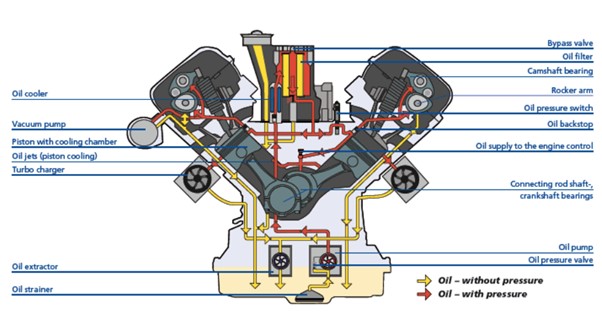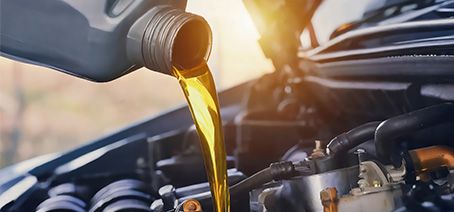Why do we need engine oil?
Machines require lubricants to function, and vehicles are no exception. The engine is the heart of any vehicle, made up of a number of parts that all require lubrication in order for them to work together to deliver optimal performance. Without oil, engines can become seriously damaged from friction and over-heating, resulting in costly repairs.
With engine oil providing several functions to an engine and with so many varying oils available, understanding what it is, what it does and how it works can get confusing.
What is engine oil?
Engine oil – also known as motor oil or engine lubricant – comprises a range of components used to lubricate and improve the performance and life span of internal combustion engines. They typically consist of base oils, which are enhanced with various additives specific to the application of the lubricant.
What is a base oil?
A base oil is the major component within a blend, and ranges from mineral oil derived from crude oil, all the way to man-made synthetics.
Base oils are chosen based on various properties, including -
- load carrying viscosity
- volatility
- lubrication properties
- low temperature performance
- oxidation stability
What is an additive?
Additives are components added to a base oil to give additional properties or to negate negative properties of the base oil.
Additives can contribute to oxidation stability and low temperature performance and are typically chosen based on detergency, dispersancy, anti-wear protection and anti-foaming properties
How does engine oil flow through an engine?
An engine is a complicated piece of machinery, with a multitude of components having to work together in harmony to power a vehicle. Below is a diagram of an engine, highlighting the flow of oil through each part.

Oil is stored in the oil pan (or sump), seen here at the bottom of the diagram. The oil pump picks up the oil, filtering it through the oil strainer.
From the strainer, the oil is first delivered through the oil filter, before passing to the various components.
The correct pressure and flow rate of the oil is essential to the proper function of components such as the main and big end bearings on the crankshaft, turbo charger, camshaft and valves.
Types of engine oil
- Refined crude oil with additives to enhance its protective properties
- Available in a wide range of viscosity grades
- Cheaper as they are based on naturally-occuring materials
- Base oils tend to have higher levels of impurities and offer lower levels of protection
- Manufactured in a petro-chemical plant from base organic materials
- Boasts greater refinement and more uniform chemical compositions
- Fewer impurities
- Higher viscosity index
- Improved low temperature performance
- Better resistance to corrosion and oxidation
- The most expensive type of engine oil (often reserved for more high-performance engines or vehicles)
- A combination of mineral and synthetic oil
- Provides the improved resistance of synthetic oil without the premium price tag
5 functions of engine oil
Lubricants leave a thin film over components which minimises friction between parts. Reduced friction subsequently reduces wear, meaning longer life for engine components. Engine oil should have the ability to stick to components so that they are protected from damage through cold starts - this applies to both cold temperatures and times when an engine hasn’t been started for a period of time. In areas of boundary lubrication, anti-wear additives provide a chemical film to reduce wear, whereas other components are protected by a pressurised oil film
The aforementioned reduction in friction also comes with the benefit of reducing heat from moving parts. This, in turn, reduces the overall operating temperature of the engine. Overheating of components. Lubricants also help to transfer surface heat and disperse it safely to another part such as the oil sump. Some engine oils have oil coolers which further enhance the cooling properties by transporting heat from hot areas.
Lubricants maintain internal cleanliness in two ways: by suspending contaminants within the fluid (through additives called dispersants), or by stopping contaminants from adhering to components (through additives called detergents).
Engine oil must prevent or minimise corrosion of internal components. This is achieved by chemically neutralising corrosive substances.
Engine oil also acts as a sealant in certain parts of the engine. For example between the piston and cylinder as they are not completely smooth. This optimised engine performance and increases efficiency.
What happens if I don’t change my engine oil regularly?
Engine oil collects contaminants and impurities. Over time, the oil will experience a build-up of these contaminants. This seriously affects the performance of the oil and subsequently, your engine. Lubrication properties are diminished, resulting in more wear and tear of engine components.
How often should I change my engine oil?
Oil change intervals will vary depending on the age of the vehicle, type of oil and driving conditions. With advancements in lubricant technologies, interval times have increased in recent years. The recommendation used to be to get your oil changed every 3,000 miles, however, many carmakers nowadays recommend every 5,000 to 7,500 miles. For fully synthetic oil, intervals are even longer at a suggested 7,500 to 15,000 miles.
Longer drain intervals are now available, however, we recommend that the oil is changed at the manufacturer quoted period.
Which engine oil do I need for my vehicle?
It is imperative that you check the manufacturer's specifications when choosing engine oil as using the wrong one can affect the performance of your vehicle, and even cause severe damage to components.
We understand that choosing the correct engine oil for your vehicle can be a complex task.
The > FUCHS Oil Chooser eliminates the guesswork allowing you to find the right product in under 1 minute. Simply enter your vehicle registration plate or make and model to discover lubricants relevant to your specific vehicle.
Alternatively, contact our team using the enquiry form below.
ANY QUESTIONS?
Here at FUCHS UK, our teams of experts are always on-hand to answer any of your questions. With years of experience in automotive lubrication you can trust that you’re in safe and knowledgeable hands.
NEED TECHNICAL HELP?
Speak to our technical team today to learn more about how FUCHS products can help you.



